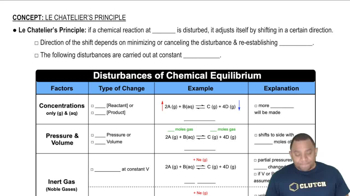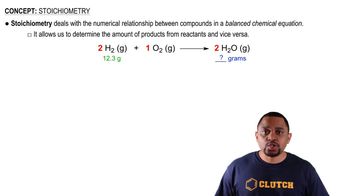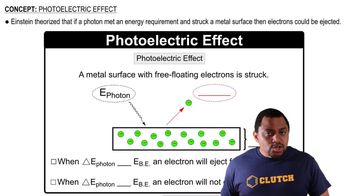Methanol (CH3OH) can be made by the reaction of CO with H2: CO(𝑔) + 2 H2(𝑔) ⇌ CH3OH(𝑔) (b) To maximize the equilibrium yield of methanol, would you use a high or low temperature?
Ch.15 - Chemical Equilibrium

Brown15th EditionChemistry: The Central ScienceISBN: 9780137542970Not the one you use?Change textbook
Chapter 15, Problem 67
Ozone, O3, decomposes to molecular oxygen in the stratosphere according to the reaction 2 O3(𝑔) ⟶ 3 O2(𝑔). Would increasing the pressure by decreasing the size of the reaction vessel favor the formation of ozone or of oxygen?
 Verified step by step guidance
Verified step by step guidance1
Consider Le Chatelier's Principle, which states that if a dynamic equilibrium is disturbed by changing the conditions, the position of equilibrium shifts to counteract the change.
In the given reaction, 2 O_3(g) ⟶ 3 O_2(g), compare the number of moles of gas on each side of the equation.
The reactant side has 2 moles of O_3, while the product side has 3 moles of O_2.
Increasing the pressure by decreasing the volume of the reaction vessel will shift the equilibrium towards the side with fewer moles of gas to reduce the pressure.
Since the reactant side has fewer moles of gas (2 moles of O_3) compared to the product side (3 moles of O_2), the equilibrium will shift towards the formation of ozone, O_3.

Verified video answer for a similar problem:
This video solution was recommended by our tutors as helpful for the problem above.
Video duration:
3mWas this helpful?
Key Concepts
Here are the essential concepts you must grasp in order to answer the question correctly.
Le Chatelier's Principle
Le Chatelier's Principle states that if a dynamic equilibrium is disturbed by changing the conditions, the system will adjust to counteract the change and restore a new equilibrium. In the context of gas reactions, increasing pressure favors the side of the reaction with fewer moles of gas, as this reduces the overall pressure.
Recommended video:
Guided course

Le Chatelier's Principle
Stoichiometry of the Reaction
The stoichiometry of a chemical reaction describes the quantitative relationship between the reactants and products. In the given reaction, 2 moles of ozone (O3) decompose to form 3 moles of oxygen (O2). This indicates that the product side has more moles of gas than the reactant side, which is crucial for understanding how changes in pressure will affect the reaction.
Recommended video:
Guided course

Stoichiometry Concept
Effect of Pressure on Gas Reactions
The effect of pressure on gas reactions is significant because gases occupy space and their behavior is influenced by changes in volume and pressure. According to the ideal gas law, increasing pressure by reducing the volume of the reaction vessel will shift the equilibrium towards the side with fewer gas molecules, which in this case is the reactants (ozone).
Recommended video:
Guided course

Photoelectric Effect
Related Practice
Textbook Question
Textbook Question
Methanol (CH3OH) can be made by the reaction of CO with H2: CO(𝑔) + 2 H2(𝑔) ⇌ CH3OH(𝑔) (a) Use thermochemical data in Appendix C to calculate ΔH° for this reaction.
Textbook Question
Methanol (CH3OH) can be made by the reaction of CO with H2: CO(𝑔) + 2 H2(𝑔) ⇌ CH3OH(𝑔) (c) To maximize the equilibrium yield of methanol, would you use a high or low pressure?
Textbook Question
(a) Is the dissociation of fluorine molecules into atomic fluorine, F2(𝑔) ⇌ 2 F(𝑔), an exothermic or endothermic process?
Textbook Question
(b) If the temperature is raised by 100 K, does the equilibrium constant for this reaction increase or decrease?
Textbook Question
(c) If the temperature is raised by 100 K, does the forward rate constant kf increase by a larger or smaller amount than the reverse rate constant kr?
